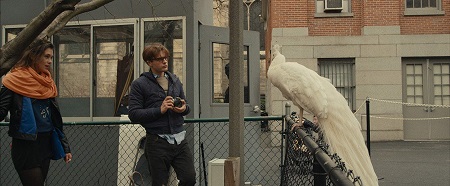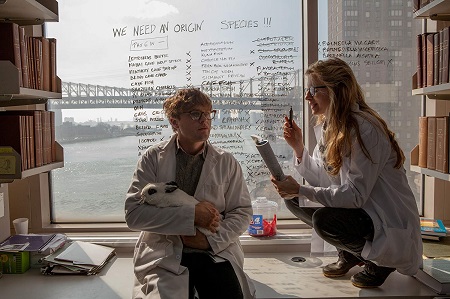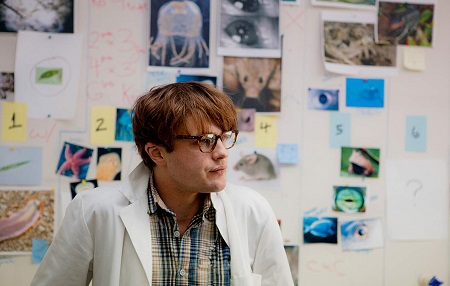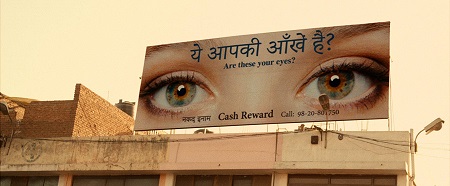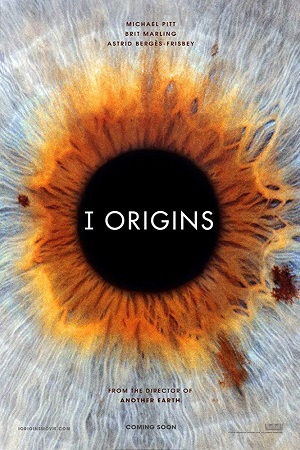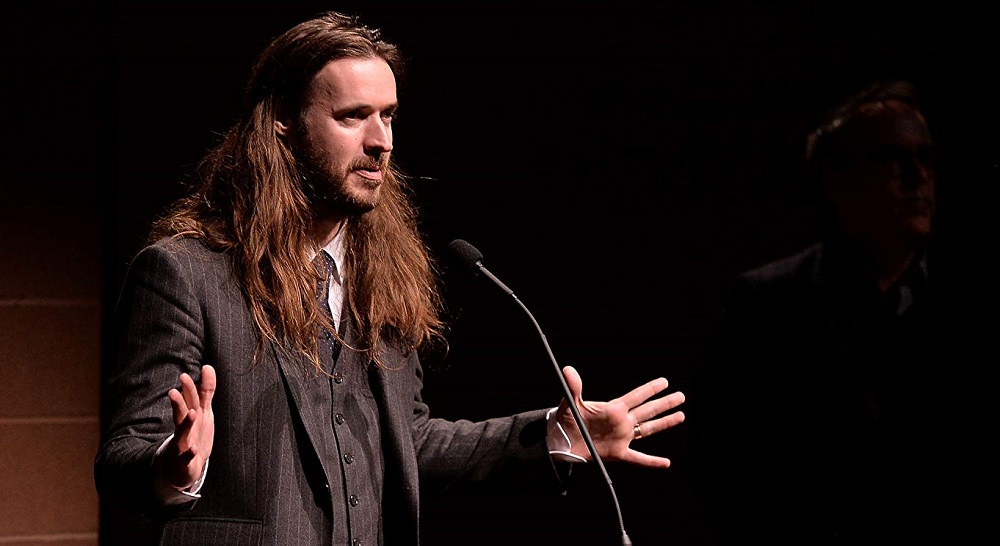
“I Origins” – Interview with Mike Cahill
by Sara Michelle Fetters - July 18th, 2014 - Film Festivals Interviews
a SIFF 2014 interview
A Closer Look
Mike Cahill’s Origin Stares Life, Love and Loss Straight in the Eye
Mike Cahill‘s I Origins follows molecular biologist Dr. Ian Gray (Michael Pitt) as he attempts to chart the evolution of the human eye in the hopes of answering age-old questions both science and religion have been fascinated with for centuries. He is aided by his assistant Karen (Brit Marling) while at the same time is engaged in a passionate love affair with free-spirited model Sofi (Astrid Bergès-Frisbey), his relationships with both women shaping and molding his life in increasingly unforeseen directions.
The movie is a beguiling mystery of self and identity that got under my skin, staying with me for days afterwards as I mulled over all of its fascinating twists, turns and secrets. It is a science fiction drama where truth, lies and everything in-between crash together in increasingly unforeseen ways, everything building to a shattering conclusion that is as shocking as it is beautifully life affirming.
To say more about the plot would be to ruin the surprise, all of which made sitting down with the talented writer/director to discuss his film more than a bit difficult. Even so, here are some of the highlights from our conversation, and while there are potentially a few spoilers here and there, for the most part we did our best to keep them at a minimum.
Sara Michelle Fetters: After Another Earth and now this, I think it is readily apparent you are fascinated with concepts of identity and of self. You seem to want to get an intimate idea of who we are as human beings and how we compose our personalities over time. Same time, how do you make the jump from your first narrative feature to I Origins?
Mike Cahill: There are two deep things as human beings that we have to deal with and that’s death and loss. We need to make sense of them. If there is a way to construct a movie, no matter how elaborate, that through the use of love we can look at and diminish the fear of death and the pain of loss, then I think we have something special. This has been the goal of great writers and thinkers and filmmakers since the dawn of storytelling. And I guess, in my way, I’m just making my attempt to make my little contribution. In all seriousness, and to answer your question, the eye seemed to be this rich canvas where poets and spiritualists and science all had put down a lot of ink. For me, it was an intriguing dream, and so I composed this script utilizing the eye as a means to construct a drama that would hopefully diminish our fear of death and diminish our pain from loss. At least, that was the hope.
Sara Michelle Fetters: How hard is it, then, when you tackle something like this to balance the ideas inherent in the science fact with the needs of science fiction? Where is that line? Do you want the audience to be able to figure out where the line is? Want them to be able to see or ascertain what is fiction and what is fact?
Mike Cahill: With this movie, there is a great deal of science fact. All the experiments in the film are real. I have the great fortune of having two of my best friends in the world, and my two older brothers – they’re all actual scientists working in the field of molecular biology. The thing about scientists, there’s a caricature of them that’s oftentimes presented in popular culture and I wanted to get away from that. I wanted to really capture the truth of what it is these guys are about. They are people of great passion. They have great romances. They talk about music and literature. They go out and have beers. They party. They watch YouTube. They are real, three-dimensional and interesting guys and girls with great senses of humor who also happen to have their main goal not be financial, but instead increasing the sum total of human knowledge. Discovery. Breaking barriers.
To me, that’s so noble. That’s exciting. As such, I wanted to see their stories represented accurately. At least, that was the goal.
Sara Michelle Fetters: Same time, you’re presenting this sort of character, revolving things around a person of science, attempting to show him three-dimensionally without resorting to cliché, but in doing so you’re upfront about his religious beliefs. Or, more to the point, lack of them. For all intents and purposes, Dr. Ian Gray is an atheist and probably does not believe in God.
What I think is interesting, however, is that you never actually say there is no God. You never purport religion is a fallacy. In a 2014 filled with so many so-called faith-based hits, this movie might just be the most faith-centered film I’ve seen. How is that possible?
Mike Cahill: That’s wonderful for you to say. I’m so glad you’ve pointed that out. I appreciate that so much. I strove to not get bogged down in the language of religion or faith, not to have actual discussions about the existence of God, but to instead let people take a look at their own beliefs and their own concepts of faith and come to their own conclusions as to what is going on and why. We tried to avoid using any terms that are loaded where it comes to faith by keeping things as close to the scientific realm as we can. And, because of that, we can have these characters come face-to-face with this strange, unusual, mind-boggling data and then watch as they grapple with that.
It’s not far-fetched to imagine what occurs in this film to be real. Biometrics is real. India really does have the world’s largest iris scanning program. Eyes and irises really are unique for everybody. All of that is legit. So, what happens when characters of science and of data are faced with information that cannot or should not exist? What happens when they use science to prove that what they are seeing, and should not be seeing, is in fact real? Those are questions I find interesting and hoped the audience would as well.
Sara Michelle Fetters: There are three signature moments in the film that took my breath away. One involves an elevator, a sequence I don’t want to go into too much detail about for obvious reasons. Another is the final scene which, again, we probably shouldn’t talk a lot about, so we don’t ruin it for the viewer. But there is another scene, a moment between Pitt and Marling where he talks about his former relationship and he admits something to her there that really resonated with me. It’s rare to hear someone in a movie talk about former or lost loves quite like this.
Mike Cahill: That scene was a tough one. I went in wanting to show the strength of Ian and Karen’s relationship, that they could be this honest with one another and not be hurt by the truths being said. At first, I thought we needed to have them hugging and kissing, snuggling up to one another, doing things in something of a traditional fashion as Ian makes his declaration.
When we got to the set, I thought, this isn’t right, that we needed to do this scene in the opposite way, to do the unexpected. I wanted to put them in the most difficult of situations and standoffs in order to see how they would get out of it in a way that honestly showed their relationship for what it is, that spoke to the inherent truth of their love. So I rewrote the scene to reflect this change, almost on the spot, and, after I did, I started to wonder how the heck we were going to pull this off.
Sara Michelle Fetters: You chose to have faith in your actors.
Mike Cahill: Yes. Exactly. It’s all Michael and Brit. They’re just brilliant. [They] brought so much humanity to the scene. They’re so intimate. So human. You see that their bond is incredibly deep, stronger than the soap opera, petty vulnerabilities and insecurities that can’t help but exist. They value their partnership. They value their love. Most of all, they value the truth behind their relationship, and about who they are as both a team and as a couple, so Michael can make the declaration that he does. Not without fear, there’s always fear, but steady in the knowledge his honesty will strengthen their mutual bond. Both actors are so good in the scene in my opinion. They transcend the moment. They truly do.
Sara Michelle Fetters: The relationship between Michael and Brit makes a great counterpoint to the one between Michael and Astrid. The latter is so picturesque, so angelic, in its way, almost French New Wave, while the former feels extremely grounded, concrete, devoid of that flighty ephemeral effervescence, yet it is still presented in a way that’s equally touching.
Mike Cahill: The heart of the movie is really about these two very different types of love. Take away the science. Take away the tragedy. Take away the fantastical sci-fi elements. What you are left with are these two incredible romances, both of which couldn’t be more different from the other, yet each is equally heartfelt and important. One of them ends without closure. The other, totally different in texture, tenor and feeling, yet just as deep and potentially long-lasting, still lives in the shadow of the one that came before, and I think that is something anyone who has ever been in their fair share of important relationships can hopefully relate to. In science fiction, the idea is that you can strip away the sci-fi elements and still have a story, still have a movie, because you’re just using those fantastic elements to get closer to human elements anyway.
Sara Michelle Fetters: How hard is it to figure out how much you want to tell the audience and how much you want to leave to them to figure out for themselves? You do have a tendency to put the audience to work, which to my mind isn’t necessarily a bad thing.
Mike Cahill: I do have a tendency to put the audience to work. That is very true. But I really respect the audience. I think they can handle it. When I was at Georgetown [University] I saw three movies in one week: Soderbergh’s Sex, Lies and Videotape, Julian Schnabel’s Basquiat and Krzysztof Kieslowski’s Red. That week changed the trajectory of my life. All of the sudden I was like, cinema, wow, this is incredible.
I honestly don’t think I knew what cinema was until that week. Didn’t fully understand that it was an art form. It transmits an emotion that cannot be transmitted in any other form. I mean, if you think about Red, there’s a moment where Irène Jacob’s image is frozen on the screen in the same compositional as the advertising billboard that existed earlier in the film. It’s like this metaphysical, metaphorical moment that unlocks these secrets and adds so much meaning, but it’s up to the audience to figure all of that out without Kieslowski spelling out the answers. Even talking about it now I get chills. It’s this feeling you have when you experience it, a feeling you’ll likely keep feeling far into the future.
Now, that feeling, that feeling is owned by me as an audience member. It’s mine. Hopefully, that’s the same sort of feeling, or some facsimile of it, that audience members will experience when they watch Another Earth or they watch I Origins. But, I mean, I’ve only made two movies. I’m still working at this. But that’s the experience that I’m after. I want to let the audience own their experience watching my film. Sure. Yes they have to work for it, but that work can hopefully lead to a great pleasure they’ll take with them long after my story has ended.
Sara Michelle Fetters: I love that you brought up Kieslowski because I was going to say that, in a way, you’re two-thirds of the way through your own sort of metaphorical trilogy along the lines of Blue, White and Red, both Another Earth and I Origins not only sharing some similar thematic musings but also a leading lady, Brit Marling.
Mike Cahill: You’re right! I guess now she and I have to make a third movie. I wonder what it should be? I’ll have to think on that. Honestly, I think for the rest of my life I’ll still be scratching at all these metaphorical questions more than likely. If I’m lucky, I’ll be able to work with Brit for the rest of my life as well. She’s incredible.
Sara Michelle Fetters: I know we’re coming close to running out of time, and while I do want to talk about Brit and your ongoing relationship with her, we’d be remiss if we don’t get into a conversation about Michael.
Mike Cahill: He’s brilliant. I have admired Michael for a very long time. He makes so many outstanding, idiosyncratic choices. He is always bold, unique, [and makes] unanticipated decisions as to how it pertains to the character and to the movie. He’s just fascinating to watch and to work with. I knew he would just kill it here. He brings so much to the table. As Ian, I think he’s just mesmerizing, bringing so much of his fine-tuned instrument to the role and to his performance. By all accounts he makes the movie what it is. I don’t think we’d be talking if he hadn’t delivered in the way he did.
Like the elevator scene – we only did one take of it – and it’s this big, pivotal moment the whole movie more or less rests upon, but we could get away only doing it once because Michael’s just so damn amazing. Before we shot it, Michael was like, I’m going to go there, I’m going to go all the way there, and it will probably mess me up, so hopefully we won’t have to do it more than once.
So, we cover the scene with multiple cameras almost as if we’re filming this huge explosion or some crazy action sequence, but it’s really just Michael sitting there, letting every ounce of himself out for all the world to see. He worked so hard. He gave so much of himself. Michael becomes his characters, bringing this level of authenticity that’s almost unbelievable.
Sara Michelle Fetters: Not to go into too great of detail, did you ever worry you were holding the scene for too long? That you were letting too much time pass before the big reveal?
Mike Cahill: I think we did it just exactly right. It’s always hard to tell. I cut out the sound just as we experience the trauma from his point of view because I wanted that disassociation with the senses to happen for the audience as well. Also, the idea that there’s still lucidity, that there’s still something going on, it was important I think to make sure Ian discovers what’s happening in real time, and not just in some unrealistic, sensational way. Makes it more powerful, hopefully, I think.
Sara Michelle Fetters: At the end of the day, what do you want the audience to take away from the film? What do you hope they’ll experience?
Mike Cahill: I want them to think that Michael Pitt is a genius. I want them to think Brit Marling is a genius. I want them to think all of the actors are amazing. But what I really hope? What I really hope is that, afterwards, when it’s over, people will look deeper into the eyes of their loved ones, they’ll look closer than ever before, memorizing every little detail. That’s what I hope they do.
– Interview reprinted courtesy of the SGN in Seattle
